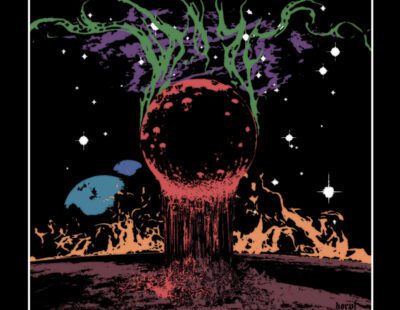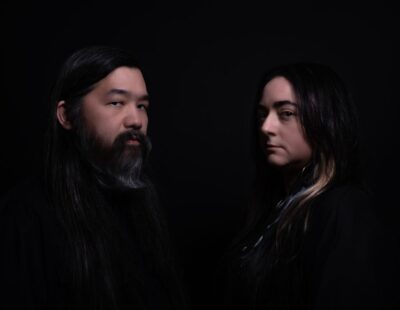
By now, we hope you have been enjoying Gojira’s new album, Magma, as much as we have. We also hope you’ve had a chance to read our cover story, in which Mario and Joe Duplantier describe their career and how it has led to their greatest personal satisfaction in a set of songs so far. If you haven’t gotten to it yet, grab the issue now, chock full as it is of a Dropdead Hall of Fame story, our post-MDF 2016 coverage and input from Revocation’s David Davidson, Gruesome’s Matt Harvey and the inimitable Abbath.
Even if you have read the Gojira cover story, you should know that we neglected to share all of our conversation with the Duplantiers, and we feel bad about that. What follows here are outtakes from that conversation, including discussions about specific songs on Magma, the forthcoming U.S. tour and that mystical, mysterious place called NYC.
What are the emotions and experiences that most influenced this album?
Mario: We took time to record this album and to compose it, so I would say that there are many influences, [many] different moments. For example, when we came with the first riff from “Shooting Star,” it was back in 2013 on the road with Slayer. In the bus, Joe came up with this idea. Same with the first riff of “The Cell,” the crazy one with all the polyrhythmic stuff. We composed this riff in the bus back in 2013, too. So it’s a mix also of different experiences. I remember, for example, the first riff of “Pray” is this crazy [mouth riffs], I had this riff in my mind for three years, and I did demos of this riff, so this riff was created a long time ago and I felt it was great to also to work on the dynamics. For the first time, we worked a lot on the dynamics of the album, the mood of the album. We wanted a perfect balance of emotional songs and also some songs with very catchy, dynamic riffs. I thought it was very important to bring a very dynamic and balanced album.
How did that beat on “Pray” come about?
Mario: A lot of songs on our previous albums – like “Toxic Garbage Island” or “Explosia” or “The Art of Dying” – we have tons of songs that start with the drum part. I work on my drums a lot before touring and between tours, and it’s always a challenge to create new exercises. It’s my best way to increase [my skills] as a drummer. I want to progress, so I always invent exercises, and for ‘Pray’ it was another exercise: to start with the right foot, then start the second group of notes with the left foot… So it’s a balance between starting with the right foot and starting with the left foot. If you analyze it, it will be right-left-right, left-right-left-right-right… actually, it’s a challenge to start a group of three notes with the left foot. When you start with the left foot, it’s very technical. It’s very tough.
Joe, How do you feel about singing so much on the new album?
Joe: My approach to singing is a little shy almost, but I’m doing better, and maybe one day I’ll be ready to really sing. But when I sing, it’s more like another instrument. It’s interesting. I’m on a journey and I’m learning by myself how to sing, little by little. I like to take my time. It’s not a big deal. Things are progressing slowly. I’m not impressed by what I do. Sometimes I wish I could really sing and accept what’s coming out, open the door and completely open myself and let one powerful vocal track on the music. I really admire singers that are able to do that. And I have to do that live, and I refuse to use any kind of ProTools recorded vocals on stage. On albums I’m too tempted to put a lot of backing vocals, but I love doing this.
Are there vocalists you look up to?
Joe: Devin Townsend is one of these singers that are completely amazing, out of this world. I can’t compete with him, but I definitely get inspired. I love [Maynard James Keenan of] Tool… There’s a lot of singers that I think are great.
How important was sequencing?
Mario: I spent three weeks, every day, trying a new set list. It created a headache for me. I was just trying to find the best solution. It’s crazy because one time I talked to our artistic director, and he told me, “Ok, guys, we really need the sequence of the album,” so after a few weeks of reflection I gave my set list and he told me it’s exactly what he was thinking! From his side, also, he tried to do something, and we were exactly on the same page, so I was very happy. We thought it was important to start with something new, and basically we just had to split all the other songs between “Shooting Star” and “Magma” and “Low Lands.” I thought it was great to have “Pray” after “Magma” because there is some double bass, very percussive riffs, it was great to contrast with the organic, very melodic side of “Magma.” I felt it would clean the ears.
Do you feel that people sometimes wrongly analyze or misunderstand your musical choices?
Mario: Yeah, of course, but you know it’s subjective. Sometimes I agree. Some people said “Stranded” is a lazy song. I was reading this and I said, ‘Yes, maybe it is kind of lazy!’ Because I remember I told my brother I wanted to play simply, I want to serve the chorus, and you know what? I won’t do a fill on the drum set, I’ll just do [mouths a simple but heavy beat]. But my goal was to be lazy, so I agree with this guy when he’s complaining it’s too lazy. Maybe it’s too lazy for him, and I accept this. I’m a musician and I can understand the mentality when you compose something, you have a certain need and you are in a moment of your life and people cannot really understand what’s happening.
How soon after album release will you play more new songs live?
Mario: Maybe the day of the release we are going to add two more songs, but it’s true that we will need maybe a good twenty days of rehearsals to make sure that “Magma” sounds good, and “Pray,” before playing for the U.S. tour.
Does touring so much get tough?
Joe: It’s cool, it’s exciting. We’re always happy to be on tour. We love our crew, they’re all very nice and cute. We like to hang out with our crew. That’s all we do on tour, reallym – we’re stuck with a bunch of dudes. There’s a good vibe between all of us, so it’s never a bad thing to be on tour with these guys, but the downside is that we leave our families behind. That’s really, really hard. But they know, they understand what we’re doing, so it’s cool.
Now that Joe lives in New York City, where are the other guys in the band located?
Mario: They love France. Jean Michel [Labadie, bass] cannot go in a city. He feels sick after two hours. He needs to be in the mountains, in the middle of nowhere. Even in the streets of a small village he feels bad. He needs to be in the woods. He hates cities. But Christian [Andreu, guitar] loved New York. “I want to live here!” he said, because Brooklyn is so amazing.
Joe, what made you choose to move to New York City?
Joe: I don’t know. It’s mystical. It’s weird. Since I was five years old, I wanted to live in New York. For a mysterious reason, I don’t know. Maybe it’s that thing: My mom being American and [me] growing up in France, I received a different education than the average French [kid], ‘cause my mom was American – really expensive and speaking louder than our neighbors – so I have that in me, somehow. When I’m in the States, I’m the French guy that feels like he belongs here but is not from here, and when I’m in France I feel like [people think], ‘Oh, you’re the American guy.’ So I’m kind of in between a little bit, but I’m really glad I moved to New York. It’s good for me.
Do you spend time at your relatively new Silver Cord Studio?
Joe: If I didn’t have kids, I would gladly hang out more at the studio and jam and meet with friends and have drinks or whatever. Sometimes it happens, when I’m done with a job or recording something, and a friend stops by and we stay a little bit. But because I have a family, I usually run back home to be with them, to be with the kids. They’re very small and they need their daddy. Especially when he’s not on tour. I try to be a good boy.
Catch up with Gojira on tour this summer and fall, and get merch at the band’s store.






